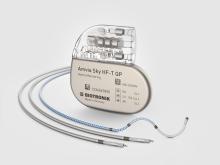Four Ways to Lower Your Atrial Fibrillation Risk
Atrial fibrillation is the most common type of heart arrhythmia and affects about 30 million people worldwide.

Atrial fibrillation occurs when the heart’s two upper chambers beat too slowly, too quickly, or too irregularly to pump blood properly to the heart’s bottom chambers, or ventricles. People with “Afib” or “AF” may experience symptoms ranging from heart palpitations or irregular heartbeats, feeling lightheaded, chest pain, pronounced tiredness, to feeling short of breath. Other patients may have no noticeable symptoms at all. AF, however, carries an increased risk of stroke and the heart’s pump function is also reduced. AF can come and go in episodes lasting for a few minutes or hours before the heart goes back into normal rhythm. These short AF episodes are sometimes called “paroxysmal AF,” whereas any AF episode lasting longer than 30 seconds is often called “recurrent AF.” In other cases, AF may keep coming back or be permanent. When this happens, doctors will sometimes call it “persistent AF” or “permanent AF,” respectively. Depending on the individual case, physicians treat AF in a number of ways, from blood thinning medication to lower a patient’s stroke risk, to therapies that restore and maintain normal rhythm through medication, or a procedure called radiofrequency ablation, conducted by a cardiology specialist called an electrophysiologist. Even after successful therapy that restores normal heart rhythm, there is still a high risk of AF recurrence. However, there are a number of ways people can reduce their AF risk in general.
Step One: Get that Exercise In
Maintaining an exercise program can lower the severity of AF symptoms patients suffer from and maintain more normal heart rhythm. That’s according to late-breaking research presented at this year’s European Society of Cardiology (ESC) Congress—the world’s largest cardiology conference. Australian researchers found that some AF patients could control their AF through exercise alone—with no need for medication or complex ablation procedures. Researchers sought to make sure study participants were getting at least 3.5 hours of aerobic exercise a week, with a few higher intensity cardiovascular activities, for at least six months. Those who did had a 60 percent reduced rate of recurrent AF. When these patients did get AF, their symptoms during episodes were also less severe.
Step Two: Moderate Your Alcohol Intake
You don’t necessarily have to give up a glass of wine with family or a beer with friends completely to lower your AF risk. In fact, researchers find almost no increased AF risk in people who have seven drinks or fewer in a week. The risk goes up after that though, with a significant increase in people consuming more than 14 drinks a week. If you suffer from diagnosed heart failure though, alcohol consumption can trigger an AF episode that may worsen your heart failure status. Check your pulse for irregularity, as this can be a sign of AF. If you do suffer from diagnosed heart failure, speak to your doctor about your diet and alcohol consumption.
Step Three: Watch Your Caffeine and Try the Mediterranean Diet
Caffeine is a more complex AF risk factor. One 2019 study found that men who drink moderate amounts of coffee (1-3 cups a day) actually saw a reduction in their AF risk. Energy drinks however, which contain higher concentrations of caffeine than coffee, can increase AF risks. Several observational studies have reported on how energy drinks might be associated with an increased AF risk, even in younger people. Overall, the recommended upper limit for daily caffeine intake is about 400 milligrams, the equivalent to about four cups of coffee.
Certain foods may also lower your AF risk and promote overall heart health. The “Mediterranean diet,” which is high in vegetables, fruits, grains, nuts, and unsaturated fat like olive oil, may reduce certain AF risks. A diet higher in salt may also increase the risk of AF.
Step Four: Focus on Your Overall Heart Health
You can lower your AF risks in many of the same ways you would lower your risk of cardiovascular disease in general. These include refraining from or quitting smoking, getting enough sleep, and maintaining a healthy weight through diet and exercise. Overweight people have about a 20-25% increased AF risk, which increases to a 60% higher risk for people who are obese. For more simple steps you can take for a more heart-healthy life, check out our previous post on Five Simple Measures for Heart Health.
